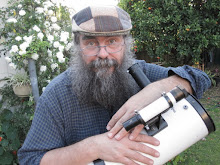Wednesday, March 27, 2013
Occultation of Spica by the Moon, Northern Australia 28-29 March,
The
morning sky facing north-east in Darwin on Thursday March 28 at 23:00 pm ACST
showing the waning Moon just about to cover Spica (Alpha
virginis,indicated by circle). (similar views will be seen from other
locations north of Lismore at a similar local time eg midnight AEST
Brisbane. Click to embiggen.
The waning Moon passes in front of the bright star Spica (magnitude 1) in the constellation of the Virgo the virgin on the morning of March 29 (eastern states) or late evening 28 March (central states).
This event is visible from sites north of a line running from Lismore NSW to the Kimberly in WA in Australia.
The bright limb of the Moon covers Spica at 0:52 am AEST Brisbane (29th), 23:09 pm ACST Darwin (28th), 0:11 am AEST Townsville (29th), 0:03 am AEST Cairns (29th)
The dark limb of the Moon uncovers Spica at 1:22 am AEST Brisbane (29th), 23:56 pm ACST Darwin (28th), 1:17 am AEST Townsville (29th), 1:12 am AEST Cairns (29th).
With the Moon two days past Full, this event is really best seen with binoculars or a small telescope (especially for the disappearance of the star on the bright limb of the Moon). If you have a tripod or other stand for your binoculars, it will be much easier to observe.
The rest of Australia see the Moon very close to SPica, so it's still worthwhile to observe.
The waning Moon passes in front of the bright star Spica (magnitude 1) in the constellation of the Virgo the virgin on the morning of March 29 (eastern states) or late evening 28 March (central states).
This event is visible from sites north of a line running from Lismore NSW to the Kimberly in WA in Australia.
The bright limb of the Moon covers Spica at 0:52 am AEST Brisbane (29th), 23:09 pm ACST Darwin (28th), 0:11 am AEST Townsville (29th), 0:03 am AEST Cairns (29th)
The dark limb of the Moon uncovers Spica at 1:22 am AEST Brisbane (29th), 23:56 pm ACST Darwin (28th), 1:17 am AEST Townsville (29th), 1:12 am AEST Cairns (29th).
With the Moon two days past Full, this event is really best seen with binoculars or a small telescope (especially for the disappearance of the star on the bright limb of the Moon). If you have a tripod or other stand for your binoculars, it will be much easier to observe.
The rest of Australia see the Moon very close to SPica, so it's still worthwhile to observe.
Labels: Moon, Occultation




 Click to read about or order
Click to read about or order Click to read about or order
Click to read about or order Click to read about or order
Click to read about or order Click to read about or order
Click to read about or order




